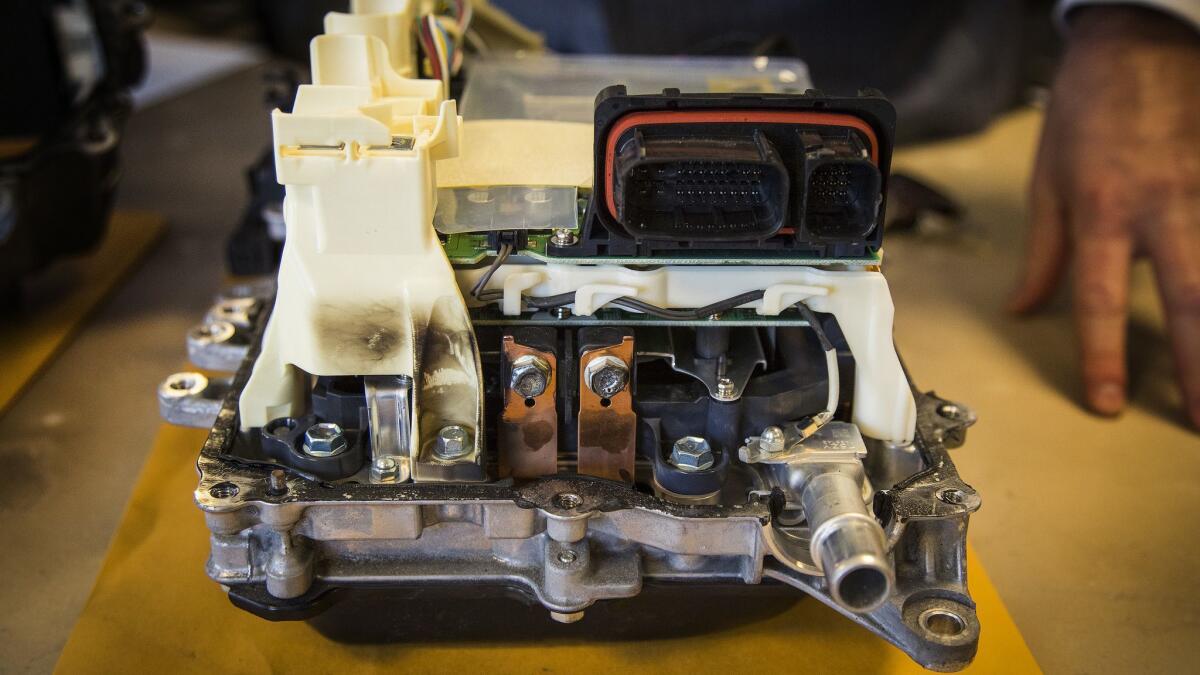Electrical defects cause Priuses to stall; Toyota may be bracing for a legal fight as safety worries grow

- Share via
Toyota is closely monitoring breakdowns in the electrical power system of some Prius models, as failures continue to mount across the nation despite a 2014 safety recall that was supposed to fix the problem, according to Toyota documents reviewed by The Times.
The Toyota documents show that more than 800 defective electrical components from Toyota Prius models were returned from dealers to the automaker and its outside technical consultant over less than a two-month period this year after electrical system failures.
The problem, in which overheating causes damage to key electrical parts and a resulting loss of power that can leave motorists stranded, has been dogging Toyota for about seven years. But the safety issue is now growing in scope.
A woman driving a Prius in Florida last year was seriously injured when she lost power on a busy four-lane highway and was rear-ended at about 55 mph. Another Prius crash on an Orange County freeway that caused injuries was reported to federal safety regulators in 2016, according to federal records.
The National Highway Traffic Safety Administration said it is reviewing a petition filed in December by a Southern California Toyota dealer, Roger Hogan, asking for a formal defect investigation. The federal agency said it has sought additional information from Hogan, who owns Claremont Toyota and Capistrano Toyota, and met with Toyota representatives in its review. The NHTSA review follows a lawsuit that Hogan filed last year and a separate suit seeking class-action status that was filed in federal court by Los Angeles attorney Skip Miller.
The issue has caught the attention of congressional safety advocates as well. Sen. Jerry Moran (R-Kan.), chairman of the Senate Commerce Subcommittee on Consumer Protection, Product Safety, Insurance and Data Security, has begun looking into the Prius problem, according to his staff.
The overheating problem occurs in a device known as an inverter, which controls amounts of power flowing between the car’s battery and its two electric motors. The device is subject to high internal temperatures that can damage transistors that convert lower-voltage direct current from the battery to higher-voltage alternating current for the motor. The power flow is reversed when the brakes are applied and electricity flows back to charge the battery.
In a statement, Toyota said, “We are continuing to monitor claims and developments in the field, and we will take any appropriate action.”
The automaker said that the Prius “has a long history as a safe and reliable vehicle and is among Toyota’s most popular models” and that it is “committed to the safety and security of our customers.”
Officials at Toyota’s U.S. headquarters in Texas appear to be bracing for a big fight. In an unusual move, Toyota began requiring in January that its dealers return every failed inverter or its main component, known as an intelligent power module, to the company’s North American headquarters in Texas, according to Hogan. Prior to that, Toyota would request only a sampling of failed parts, he said.
Then on Feb. 8, Toyota instructed dealers to send the failed inverters or modules to Exponent, an engineering and consulting firm in Menlo Park that often helps corporations weather product liability crises.
Exponent was tapped by Toyota in 2010 to defend against allegations that its Camry and other models were subject to sudden acceleration that caused numerous deaths across the nation and triggered a raft of lawsuits. Toyota was ultimately fined a then-record $1.2 billion by federal regulators for the defects and its failure to promptly notify NHTSA of them. The company was released from deferred criminal prosecution only last year.
Toyota issued a safety recall in 2014 that covered as many as 800,000 Prius models built between 2010 and 2014. The recall documents indicated that Toyota had been tracking the problem with the inverter since 2011, when its engineers found cracked solder joints that resulted from “excessive thermal stress.”
The 2014 recall modified the software that controls both the inverter and the car’s entire drivetrain computer.

The lawsuits contend that the software fix has failed to remedy the problem, citing numerous cases in which Prius electrical systems shut down even after the software was modified. Hogan said he has had 100 Priuses come into his dealerships with inverters that failed after the recall software was installed.
In his petition for a new recall, Hogan alleges that the software fix was aimed at avoiding a much more expensive replacement of the inverter and its main component, the intelligent power module, which can cost $2,000 or more. The software fix costs only $80 per vehicle, he said.
When the inverter overheats, the Prius either loses all power or goes into what the company calls “limp-home” mode, which allows it to be driven at very low speed. Hogan says he is refusing to sell more than 70 Priuses that he took on trade-in because he believes they are unsafe.
A Toyota representative rejected Hogan’s allegations, saying that the recall was intended to fix the possibility that an inverter failure could cause the hybrid power system to shut down instead of entering limp-home mode.
The company said Hogan “is pursuing his Prius recall remedy allegations to advance his $100-million lawsuit against Toyota, take the focus away from his dealerships’ poor performance and blame Toyota for his son’s failure to meet basic qualifications to serve as a general manager at one of his dealerships.” It noted that 1,200 other dealers “have not made these accusations.”
Hogan denied that assertion.
Hogan and some Toyota owners say that in some inverter failures the car still loses all power and does not enter limp-home mode. In one vehicle brought to Hogan’s dealership, the inverter got so hot that holes were melted through its aluminum case. Others had internal parts coated with soot, he said.
A sudden power loss is generally considered a serious safety defect. General Motors was forced to recall 29 million cars in North America starting in 2014 when a defective ignition switch would suddenly shut off the engine. GM offered compensation for 124 deaths related to the defect.
Instances in which a Prius loss of power has caused a crash are now surfacing.
Margaret Long, who lives in Port Charlotte, Fla., was driving to a hospital last August to pick up her husband when she lost power in her 2010 Prius on a busy four-lane highway. Long, a retired college instructor who was 80 at the time, was rammed at about 55 mph from behind, driving her car into the center median.
Long said the accident caused a cracked vertebra, two cracked ribs and a punctured lung. A head injury from the accident has affected her memory, as well.
Long’s husband, Marlin, suspects the car lost power because of an inverter failure. The vehicle records show the Prius received the updated software from the recall in 2014. The vehicle was declared a total loss by the insurer and was auctioned off.
Obray George Grubbs witnessed the accident and came to Long’s aid. In an interview, Grubbs said Long’s car was completely stopped as cars swerved around it.
“I said to myself, this doesn’t look good,” he recalled. A Toyota Camry came up at full speed and hit Long with so much force that it broke the Prius seat back, leaving Long lying on her back when Grubbs walked up to help her. “I said, ma’am, just hold still.”
In February 2016, a motorist from San Diego filed a complaint with NHTSA about his 2012 Prius, which lost power on Interstate 5, came to a stop and was rear-ended, sending him to a hospital emergency room. NHTSA redacted the individual’s name on its website, but the complaint included seven detailed supporting documents, in which the motorist focused on an inverter failure as the cause.
In his complaint, the motorist said that after dozens of phone calls, “Toyota has avoided any recognition of the fact that the car stalled.”
Follow me on Twitter @rvartabedian
More to Read
Sign up for Essential California
The most important California stories and recommendations in your inbox every morning.
You may occasionally receive promotional content from the Los Angeles Times.











